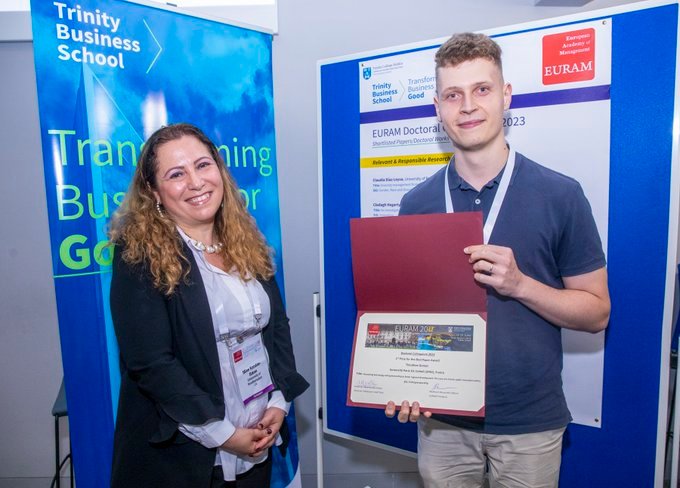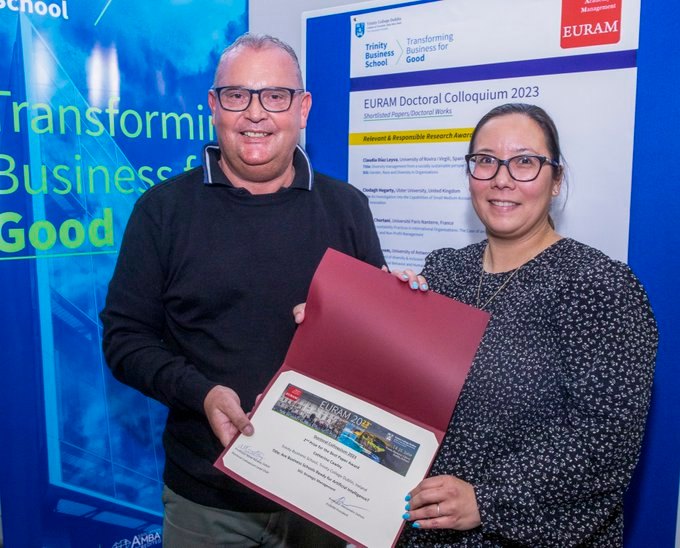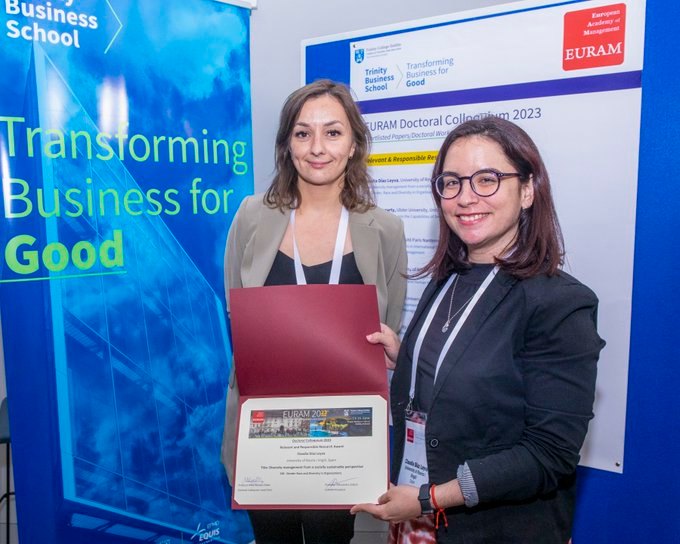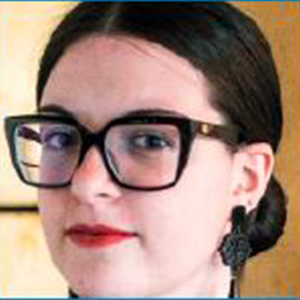Doctoral Colloquium 2023 Awards
1st Prize for the Best Paper Award

Timothee Gomot
Université Paris-Est Créteil (UPEC), France
Title: Promoting technology entrepreneurship to foster regional development: The case of a French public innovation policy
SIG: Entrepreneurship
2nd Prize for the Best Paper Award

Catherine Cawley
Trinity Business School, Trinity College Dublin, Ireland
Title: Are Business Schools Ready for Artificial Intelligence?
SIG: Strategic Management
3rd Prize for the Best Paper Award
Angela Nativio
Ca’ Foscari University of Venice, Italy
Title: The evolution of Italian saving banks as financial infrastructures of civil society – Towards an archaeology of social impact
SIG: Public and Non-Profit Management
Relevant and Responsible Research Award

Claudia Díaz Leyva
University of Rovira i Virgili, Spain
Title: Diversity management from a socially sustainable perspective
SIG: Gender Race and Diversity in Organizations
List of accepted Phd Students
Congratulations to all the applicants who have been accepted on the programme!
See you in Dublin!
(If you have not sent an application to attend the programme, it will not be possible to attend the programme)
Accepted participants to the Doctoral Colloquium in alphabetical order are:
Oumnia Abidi, Toulouse School of Management (University Toulouse Capitole)
Ehab Abu Sa’a, Linköping University
Rasidat Adedayo Adeniji Oseni, Technological University Dublin
Ulohomuno. Afieroho, Alma Mater Europaea, ECM
Ehssan Aljohani, Leeds University/Princess Nourah Bint Abdulrahman University
Mai Alqersh, The British University in Egypt
Yazan Alzoubi, University of Leeds
Andrea Ancona, Sapienza University of Rome
Mercedes Auqui Caceres, University of Padova
Appu Balachandran, Linköping University
Jordan Besson, Poitiers University / IAE Management School
Beverly BEST, University of Strathclyde
Outi Blackburn, LUT University
Lawrence G. Boakye, RMIT University
Vittorio Capitani, Università Cattolica del Sacro Cuore
Catherine Cawley, Trinity Business School, Trinity College Dublin
Beenish Chaudhry, University of Essex
Donia Chortani, Université Paris Nanterre
Jana Coenen, University of Wuppertal
Calypso Coudeville, IAE Lille – University of Lille
Hussein Darwish, University of Bath
Laura De Boom, University of Antwerp
Bárbara de Sousa, Universidade de Santiago de Compostela (USC)
Ramon Davi De Souza Rodrigues, HHL Leipzig Graduate School of Management
Silvia Delladio, University of Trento
Marzia Di Marcantonio, Università Cattolica del Sacro Cuore
Claudia Díaz Leyva, University of Rovira i Virgili
Malgorzata Faget, IAE Bordeaux
Ana Fañanás, University of Zaragoza
Pilar Gamarra Gamarra, Universidad Politécnica de Cataluña
Anaïs Garin, Université Paris Est Créteil, IRG
Timothee Gomot, Université Paris-Est Créteil (UPEC)
Xiaomin Han, Université Paris-Saclay, UVSQ
Clodagh Hegarty, Ulster University
Maria Hillier, University of Strathclyde
Josep Oriol Izquierdo Montfort, Université catholique de Louvain
Soni Jha, Temple University
Dominika Kaczmarek-Ciesielska, Kozminski University
Jenni Kaipainen, Tampere university
Mariya Kargina, University of Rome Tor Vergata
Ina Karn, University of Groningen
Olga Kavkaeva, University of Pavia
Juliette Keohane, Ecole Polytechnique
Togan KILIÇ, KEDGE Business School, Bordeaux
Joanna Konstantinou, Sheffield University
Nina Kotula, Kozminski University
Jennifer Kruwinnus, Queensland University of Technology
Loretto Leavy, University of Exeter
Simon Liegl, University of Liechtenstein
Jian Liu, University of Twente
Teresa Mannebach, Nova School of Business and Economics
Catherine McDonald, University of St. Gallen
Beatrice Meo, LUMSA
Delia Meyer, University of Lucerne
Mehdi Montakhabi, Vrije Universiteit Brussel
Tammi Murphy, Liverpool Business School/Liverpool John Moores University
Angela Nativio, Ca’ Foscari University of Venice
Guy NJAMBONG, Université de Lorraine, ICN Business School, CEREFIGE
Edicleia Oliveira, Technological University Dublin
Oumaima OMARI, Poitiers University / IAE Management School
Clara Orellana Rojas, Politecnico di Milano
Philipp Pasing, University of Wuppertal
Maria Pinelli, Politecnico di Milano
Marina Pletscher, The University of Lucerne
Samantha Rabie, University of Pretoria
Teodora Rajković, University of Belgrade, Faculty of Organizational Sciences
Carolina Ramos, Nova School of Business and Economics
Annebeth Roor-Wubs, Rotterdam School of Management
Lena Rudolf, University of St. Gallen
Saskia Salmen, Otto-von-Guericke University Magdeburg
Shikha Shalini, Yuan Ze University, Taoyuan City, Taiwan.
stefanea souza, ISCTE
Virginia Springer, University of Sydney
Nicole Steller, Witten/ Herdecke University
Faheem Uddin Syed, University of Pisa
Julia Taibi-Voigts, De Montfort University
Giovanni Tolin, Sant’Anna School of Advanced Studies
Janik Wadlinger, Friedrich-Alexander-Universität Erlangen-Nürnberg (FAU)
Joseph Watton, University of Leeds
Luisa Wicht, Friedrich-Alexander-Universität Erlangen-Nürnberg
Marie-Therese Wiese, University of Hamburg
Dan Xiang, University of Antwerp
Lu YU, Zhejiang University
Nina Zachlod, University of St. Gallen
Ghazal Zalkat, Halmstad University
Anastassia Zannoni, University of Rome Tor Vergata
Exchange and Expand
Exchange knowledge, expand your networks and generate conversations with leading management and organisation studies scholars!
Experienced management scholars will share their knowledge about undertaking doctoral research and pursuing a career in academia. They will also help open your horizons and discuss alternative career paths including a practitioner in a chosen industry, an entrepreneur utilising research base, and a policy maker in an international organisation. Learning from those scholars and asking them all the questions you have always wanted to ask is a great opportunity. Do not miss this opportunity to learn about the tacit knowledge underlying a PhD process and to get useful insights on how to complete a PhD in a successful way and how to develop a career trajectory transitioning out of your PhD.
Collaborate
The largest part of the colloquium is dedicated to the discussion of your papers in small mentoring groups – each supervised by an experienced senior academic mentor, many of them being global thought leaders and distinguished scholars in their field, and highly experienced supervisors. The aim is not that you shall give a “traditional” paper presentation, but to discuss your research with your peers in the group as well as your Mentor and seek advice and guidance on the key issues and challenges that you experience in a particular phase of doctoral research you are in. These highly intensive and interactive mentoring sessions make our EURAM DC distinctive, collaborative and future orientated. As we connect you with your peers and senior scholars in your field, we hope that we will make you an active participant of the research ecosystem for a life-time collaboration opportunity.
This is your opportunity to showcase your research and your scholarly mission to different audiences; to connect with an international network of academics and further beneficiaries and users of research; expressing your talent and win the EURAM 2023 Doctoral Colloquium Best Paper Award! Our scientific committee will select the winners of the EURAM 2023 Doctoral Colloquium Best Paper Award among all accepted submissions. This is an excellent opportunity to advance recognition of your research and you as a researcher engaging in this highly intellectual and noble work!
Engage and Stay with us
Identify your way of joining the EURAM community of researchers!
You will get guidance on how to become part of our EURAM research community. We will, for instance, invite you to become part of the European Early Career Community (EECC) and the EURAM Strategic Interest Groups (SIGs). The SIGs are the “heart and soul” of our association and SIG representatives will join in – not only with their scientific expertise as mentors and/or speakers – but also with insights on the further development of EURAM that may be of great value for you as early career researchers. Join us, connect with us, and stay with us by attending our main conference and other events throughout the year. Help us shape the future of EURAM and the future of management and organisations together!
How to Apply?
Important dates
Deadline for submissions to Doctoral Colloquium: 17 January 2023, 2 pm
Notification of acceptance: 7 March 2023
Deadline for registration: 14 April 2023
Fees For the Doctoral Colloquium 2023 only, the fees are 120.00 € (+60.00 € membership 2024). Conference registration fees are available here.
Practicalities
Please consult https://conferences.euram.academy/2023conference/ for general information about the EURAM 2023 Doctoral Colloquium and the EURAM 2023 Conference.
Also, follow us on Facebook (https://www.facebook.com/euram.eecc) Twitter (https://twitter.com/EURAM_BXL) and LinkedIn (https://www.linkedin.com/groups/8414395/ )
Submission process
Application Process
When applying, provide the following documents in pdf-format:
- Your CV.
- A Letter of Motivation
- A letter of recommendation written on the stationery paper officially used by your university and signed by your main supervisor (including all contact info) (Max 2 pages).
Further detail instructions:
- The entire paper (title page, abstract, main text, figures, tables, references, etc.) must be in ONE document.
- The maximum length of the paper is 25 pages (including all tables, appendices and references).
- Use Times New Roman 12-pitch font, 1,5 space, and 1-inch (2.5 cm) margin all around.
- Number all of the pages.
- Check that all your submitted documents print correctly and ensure that the files are virus-free.
- Only submissions in English done via the EURAM 2023 on-line website shall be considered for acceptance.
- If experiencing technical problems when submitting, contact EURAM asap.
- NO CHANGES in your text and accompanying documents can occur between submission deadline and registration/payment.
- IF accepted and WHEN your Mentor starts to organise your group, an UPDATED version of THE VERY SAME MAIN TEXT YOU HAVE BEEN ACCEPTED UPON can be circulated within your group.
- A picture of you (JPEG format) is also requested.
Dependent on the type of dissertation you are doing and on how far gone you are, you shall provide one of these text-types:
- A research proposal regardless of what kind of dissertation you are doing (mainly if you are not that far gone in your PhD process yet).
- A summary of your conventional monograph dissertation.
- A summary of each paper done/planned in your compilation dissertation + a summary of your compilation dissertation as a whole.
- A particular paper from your compilation dissertation that you would like to get feedback on.
Regardless of your choice text-type 1, 2, 3 or 4, your text must include the following elements and sections:
- What text-type you are submitting (either 1, 2, 3 or 4, see above)
- Particular questions/issues that you are encountering on which you would like to get feedback/ advice at the Doctoral Colloquium. (This is key information that we are looking for in your application. This could include academic issues/questions such as refining your research focus, choosing a theoretical angle or methodological perspective, as well as pastoral and career-related questions such as how to publish from your PhD, how to translate your PhD research to influence policy e.g., contribute to policy consultations etc.)
- Short abstract (max. 300 words)
- Up to 6 keywords
- The following outline/headlines of your main text:
-
- Introduction (including research gap and associated research questions).
- Relevance of your dissertation; theoretically, empirically, practically (Please note that Introduction and Relevance sections are highly important not only to put your research in the academic context of your chosen domain of management but also to highlight relevance of your research for practice and policy and how you as a responsible researcher (responsible to society) problematise this issue with the objective of addressing the issue and offering sustainable solutions/recommendations.).
- Theoretical framework/Key literature you are building on.
- Methodological approach/es and method/s used.
- Empirical findings (if you write a research proposal, please present expected/intended empirical findings).
- Discussion and conclusions (not applicable for text-type 4a).
- Contributions of your study (theoretical, methodological, practical).
- References.
- Choose one topic area from the list below that best matches the positioning of your PhD dissertation (these topic areas are identical with the SIGs of EURAM, except for the last one ‘General Management’, which is no SIG in EURAM):
-
- Business for Society
- Corporate Governance
- Entrepreneurship
- Family Business Research
- Gender, Race and Diversity in Organisations
- Innovation
- International Management
- Organisational Behaviour
- Project Organising
- Public Management and Non-Profit Management
- Research Methods and Research Practice
- Strategic Management
- General Management (If you work in an area not covered by any of the 12 EURAM SIGs above).
Who to Contact?
Chairs of the DC
Professor Mine Karatas-Ozkan, EURAM Vice President Talent Development, Professor of Strategy and Entrepreneurship, the University of Southampton, United Kingdom (mko@soton.ac.uk)
Professor Vadim Grinevich, Professor of Entrepreneurship and Small Business Innovation, The University of Bradford School of Management, United Kingdom (v.grinevich@bradford.ac.uk)
Professor Paul Ryan, Associate Professor in Strategy and Entrepreneurship, Trinity Business School, Trinity College Dublin, Ireland
Doctor Joanna Szulc, Assistant Professor at Gdańsk University of Technology, Poland
For questions on operational matters related to the EURAM Doctoral Colloquium, please contact nicola.pellegrino@euram.academy.
Why Apply for the Doctoral Colloquium?
Take a look at the recorded sessions from the Online DC 2021 and consider the inspiring testimonials of those who have already participated in a previous edition.



